Module12 Western music 复习课件(共19张PPT)
文档属性
| 名称 | Module12 Western music 复习课件(共19张PPT) | 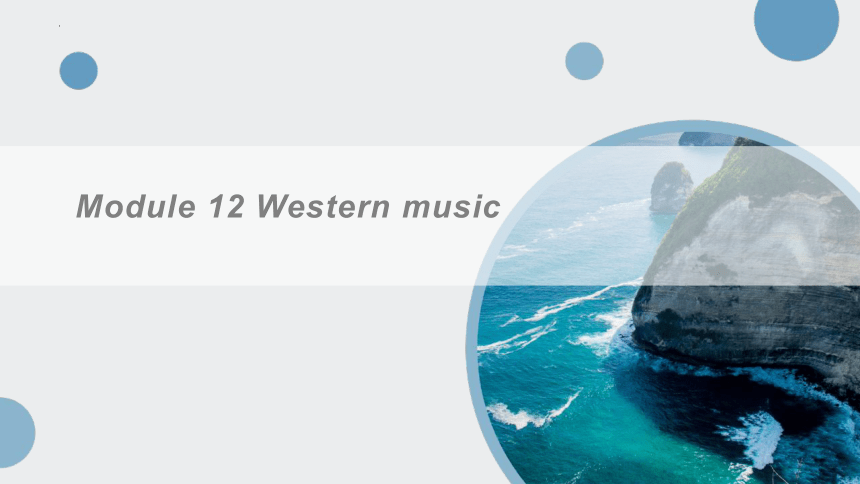 | |
| 格式 | zip | ||
| 文件大小 | 3.2MB | ||
| 资源类型 | 教案 | ||
| 版本资源 | 外研版 | ||
| 科目 | 英语 | ||
| 更新时间 | 2022-07-20 12:58:12 | ||
图片预览

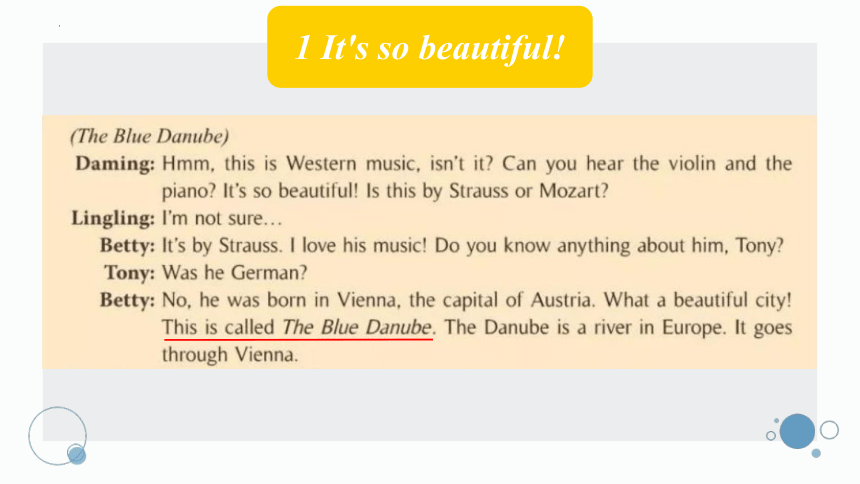

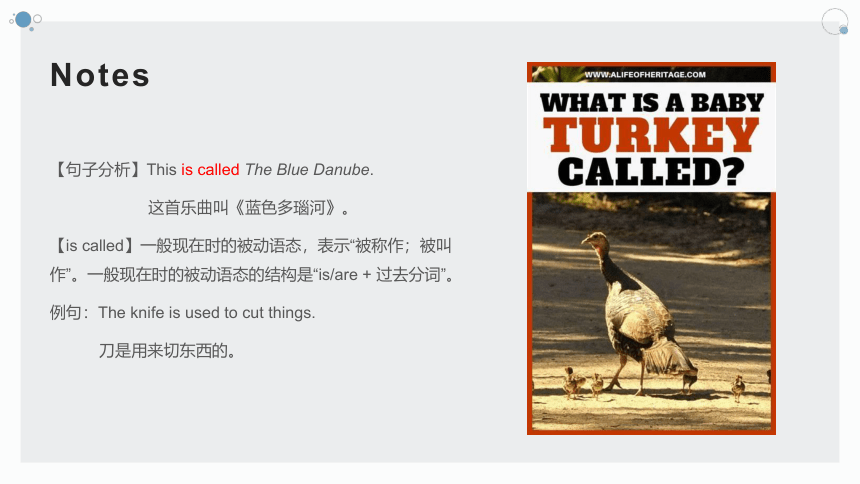
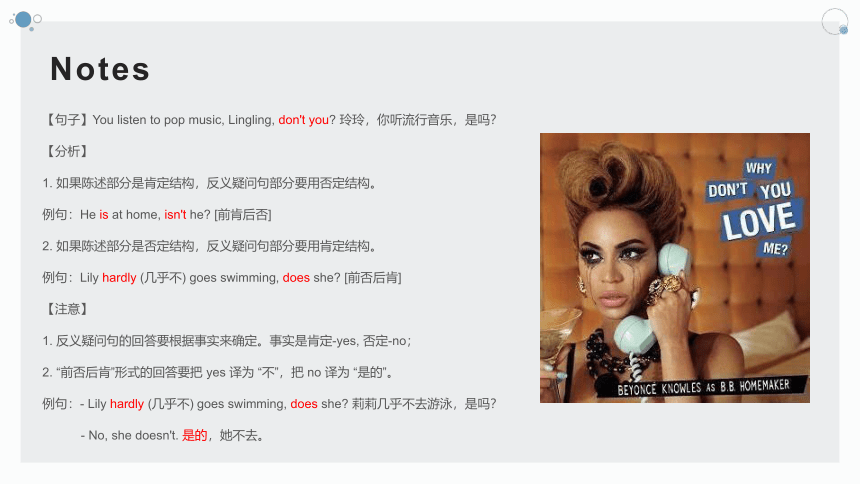
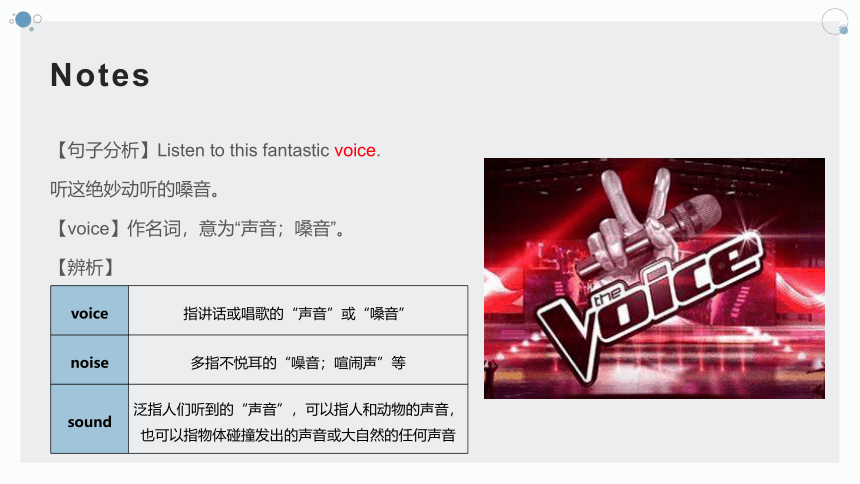
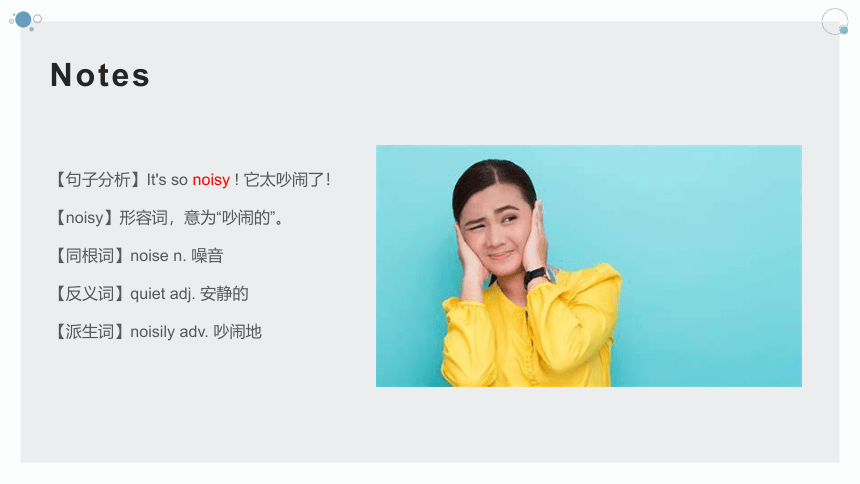
文档简介
(共19张PPT)
Module 12 Western music
1 It's so beautiful!
1 It's so beautiful!
【句子分析】This is called The Blue Danube.
这首乐曲叫《蓝色多瑙河》。
【is called】一般现在时的被动语态,表示“被称作;被叫作”。一般现在时的被动语态的结构是“is/are + 过去分词”。
例句:The knife is used to cut things.
刀是用来切东西的。
Notes
【句子】You listen to pop music, Lingling, don't you 玲玲,你听流行音乐,是吗?
【分析】
1. 如果陈述部分是肯定结构,反义疑问句部分要用否定结构。
例句:He is at home, isn't he [前肯后否]
2. 如果陈述部分是否定结构,反义疑问句部分要用肯定结构。
例句:Lily hardly (几乎不) goes swimming, does she [前否后肯]
【注意】
1. 反义疑问句的回答要根据事实来确定。事实是肯定-yes, 否定-no;
2. “前否后肯”形式的回答要把 yes 译为 “不”,把 no 译为 “是的”。
例句:- Lily hardly (几乎不) goes swimming, does she 莉莉几乎不去游泳,是吗?
- No, she doesn't. 是的,她不去。
Notes
【句子分析】Listen to this fantastic voice.
听这绝妙动听的嗓音。
【voice】作名词,意为“声音;嗓音”。
【辨析】
Notes
voice 指讲话或唱歌的“声音”或“嗓音”
noise 多指不悦耳的“噪音;喧闹声”等
sound 泛指人们听到的“声音”,可以指人和动物的声音,也可以指物体碰撞发出的声音或大自然的任何声音
【句子分析】It's so noisy ! 它太吵闹了!
【noisy】形容词,意为“吵闹的”。
【同根词】noise n. 噪音
【反义词】quiet adj. 安静的
【派生词】noisily adv. 吵闹地
Notes
rock /r k/ n. 摇滚乐
sound / sa nd/ n. 声音
music / mju z k/ n. 音乐
noisy / n zi/ adj. 嘈杂的
violin / va l n/ n. 小提琴
modern / m dn/ adj. 现代的
Western / west n/ adj. 西方的
pop /p p/ adj./n. 流行的;流行乐
lively / la vli/ adj. 活泼的;生动的
Words
2 Vienna is the centre of European classical music.
【句子分析】Vienna is a beautiful old city on the River Danube in the centre of Europe. 维也纳是位于欧洲中心多瑙河畔的一座美丽而古老的城市。
【in the centre of】意为“在...的中心”,其中 centre 是名词,意为“中心”。
【注意】center有两种写法,但发音一致/ sent (r)/。
centre [英式英语] center [美式英语]
Notes
【句子分析】In the eighteenth century a lot of musicians came to study and work in Vienna.
在十八世纪,很多音乐家来到维也纳学习和工作。
【In the + 序数词 + century】意为“在...世纪”
例句:Lao She is one of the greatest writers in the twentieth century in China. 老舍是20世纪中国最伟大的作家之一。
【结构】“one of the + 形容词最高级 + 可数名词复数”表示“最...的...之一”
Notes
【句子分析】Before he was six, he played not only the piano but also the violin. 在他六岁之前,他不仅弹钢琴,还拉小提琴。
【结构】本句是含有时间状语的复合句,before 是连词,引导时间状语从句,意为“在...之前”。
【拓展】before 还可以作介词和副词。
例句:You must arrive home before nine o' clock. [作介词]
I have never seen him before. [作副词,通常和完成时态搭配]
Notes
piano /pi n / n. 钢琴
concert / k ns t/ n. 音乐会
perfect / p f kt/ adj. 完美的
musician /mju z n/ n. 音乐家
poor /p (r); p (r)/ adj. 贫穷的
popular / p pj l (r)/ adj. 受欢迎的
European / j r pi n/ adj. 欧洲的
elder / eld (r)/ adj. 年长的;资格老的
Words
Grammar 感叹句和选择疑问句
【感叹句】由 what 或 how 来引导,句末用感叹号,朗读时用降调。
【常见句式】
what 引导的感叹句 What + a/an + 形容词 + 可数名词单数 + 主语 + 谓语! What a beautiful day it is !
What + 形容词 + 可数名词复数 + 主语 + 谓语! What beautiful flowers they are !
What + 形容词 + 不可数名词 + 主语 + 谓语! What fine weather it is !
how 引导的感叹句 How + 形容词 + 主语 + 谓语! How hot it is today !
How + 副词 + 主语 + 谓语! How fast he runs !
How + 主语 + 谓语! How time flies !
Grammar 感叹句和选择疑问句
【选择疑问句】结构是“一般疑问句 + or + 另一个选择成分?” 其中 or 连接两个并列成分。回答不能用Yes 或 No, 而是根据世纪情况从备选项中选择其一来作答。
【例句】- Do you like pop music or classical music
你喜欢流行乐还是古典乐?
- I like pop music. 我喜欢流行乐。
【注意】回答的时候还可以根据实际情况作答,如 both 或 neither.
【例句】- Would you like some tea or coffee
你想要一些茶还是咖啡?
- Neither. I'd like some juice.
都不要,我想要一些果汁。
易错易混全解
【辨析】both, either, neither, all, none
both 表示“两者都”,both...and... 表示“...和...(两者)都” Both he and his wife enjoy reading.
either 表示“两者中的任何一个”,可以和 or 搭配,either...or...表示“要么...要么...; 或者...或者...” The two coats are cheap, so you can choose either of them.
neither 表示“两者都不”,neither 可以和 nor 搭配,neither...nor 表示“...和...(两者)都不” Neither of us speaks Spanish.
all 表示“全体;全部”,用于指“三者或三者以上的人或物都” All of us are from China.
none 表示“没有一个人/物”,用于指“三者或三者以上的人或物都不” None of them has been to Japan.
易错易混全解
【辨析】other, the other, others, another
。
other 其后可以跟可数名词,可以跟单数名词,也可以跟复数名词 I have many other friends.
the other 常用于 one...the other... “一个...另一个...”的结构中 There are two bags on the desk. One is read and the other is green.
others 泛指其他人,其后不跟名词 You should help others.
another 泛指三者或三者以上中的另一个,后可跟可数名词的单数形式 Can you show me another hat
易错易混全解
【辨析】elder, older
。
elder 意为“年纪较长的”,常用来修饰人,在句中通常作定语,不用作表语。 elder brother/sister [作定语]
older 意为“年纪更大的;更老的;更旧的”,可以用来修饰人,也可以用来修饰物,在句中可以作定语,也可以作表语。 They lived in an older house. [作定语]
She is older than me. [作表语]
1. Our classroom _________ by students every afternoon.
A. is cleaned B. was cleaned C. cleans D. is cleaning
2. People in the past could hardly eat fresh vegetables in winter, __________
A. could people B. could they C. couldn't people D. couldn't they
3. - Mary has a sweet __________. - Yes, she sings very well.
A. hearing B. sound C. voice D. noise
4. Beihai Park is a famous _________ a big lake ________ the center of Beijing.
A. on; for B. with; in C. with; for D. on; in
5. Mr. Smith has a habit of taking a shower ________ he has breakfast.
A. though B. because C. before D. since
3 Language in use
A
B
C
B
C
Module 12 Western music
1 It's so beautiful!
1 It's so beautiful!
【句子分析】This is called The Blue Danube.
这首乐曲叫《蓝色多瑙河》。
【is called】一般现在时的被动语态,表示“被称作;被叫作”。一般现在时的被动语态的结构是“is/are + 过去分词”。
例句:The knife is used to cut things.
刀是用来切东西的。
Notes
【句子】You listen to pop music, Lingling, don't you 玲玲,你听流行音乐,是吗?
【分析】
1. 如果陈述部分是肯定结构,反义疑问句部分要用否定结构。
例句:He is at home, isn't he [前肯后否]
2. 如果陈述部分是否定结构,反义疑问句部分要用肯定结构。
例句:Lily hardly (几乎不) goes swimming, does she [前否后肯]
【注意】
1. 反义疑问句的回答要根据事实来确定。事实是肯定-yes, 否定-no;
2. “前否后肯”形式的回答要把 yes 译为 “不”,把 no 译为 “是的”。
例句:- Lily hardly (几乎不) goes swimming, does she 莉莉几乎不去游泳,是吗?
- No, she doesn't. 是的,她不去。
Notes
【句子分析】Listen to this fantastic voice.
听这绝妙动听的嗓音。
【voice】作名词,意为“声音;嗓音”。
【辨析】
Notes
voice 指讲话或唱歌的“声音”或“嗓音”
noise 多指不悦耳的“噪音;喧闹声”等
sound 泛指人们听到的“声音”,可以指人和动物的声音,也可以指物体碰撞发出的声音或大自然的任何声音
【句子分析】It's so noisy ! 它太吵闹了!
【noisy】形容词,意为“吵闹的”。
【同根词】noise n. 噪音
【反义词】quiet adj. 安静的
【派生词】noisily adv. 吵闹地
Notes
rock /r k/ n. 摇滚乐
sound / sa nd/ n. 声音
music / mju z k/ n. 音乐
noisy / n zi/ adj. 嘈杂的
violin / va l n/ n. 小提琴
modern / m dn/ adj. 现代的
Western / west n/ adj. 西方的
pop /p p/ adj./n. 流行的;流行乐
lively / la vli/ adj. 活泼的;生动的
Words
2 Vienna is the centre of European classical music.
【句子分析】Vienna is a beautiful old city on the River Danube in the centre of Europe. 维也纳是位于欧洲中心多瑙河畔的一座美丽而古老的城市。
【in the centre of】意为“在...的中心”,其中 centre 是名词,意为“中心”。
【注意】center有两种写法,但发音一致/ sent (r)/。
centre [英式英语] center [美式英语]
Notes
【句子分析】In the eighteenth century a lot of musicians came to study and work in Vienna.
在十八世纪,很多音乐家来到维也纳学习和工作。
【In the + 序数词 + century】意为“在...世纪”
例句:Lao She is one of the greatest writers in the twentieth century in China. 老舍是20世纪中国最伟大的作家之一。
【结构】“one of the + 形容词最高级 + 可数名词复数”表示“最...的...之一”
Notes
【句子分析】Before he was six, he played not only the piano but also the violin. 在他六岁之前,他不仅弹钢琴,还拉小提琴。
【结构】本句是含有时间状语的复合句,before 是连词,引导时间状语从句,意为“在...之前”。
【拓展】before 还可以作介词和副词。
例句:You must arrive home before nine o' clock. [作介词]
I have never seen him before. [作副词,通常和完成时态搭配]
Notes
piano /pi n / n. 钢琴
concert / k ns t/ n. 音乐会
perfect / p f kt/ adj. 完美的
musician /mju z n/ n. 音乐家
poor /p (r); p (r)/ adj. 贫穷的
popular / p pj l (r)/ adj. 受欢迎的
European / j r pi n/ adj. 欧洲的
elder / eld (r)/ adj. 年长的;资格老的
Words
Grammar 感叹句和选择疑问句
【感叹句】由 what 或 how 来引导,句末用感叹号,朗读时用降调。
【常见句式】
what 引导的感叹句 What + a/an + 形容词 + 可数名词单数 + 主语 + 谓语! What a beautiful day it is !
What + 形容词 + 可数名词复数 + 主语 + 谓语! What beautiful flowers they are !
What + 形容词 + 不可数名词 + 主语 + 谓语! What fine weather it is !
how 引导的感叹句 How + 形容词 + 主语 + 谓语! How hot it is today !
How + 副词 + 主语 + 谓语! How fast he runs !
How + 主语 + 谓语! How time flies !
Grammar 感叹句和选择疑问句
【选择疑问句】结构是“一般疑问句 + or + 另一个选择成分?” 其中 or 连接两个并列成分。回答不能用Yes 或 No, 而是根据世纪情况从备选项中选择其一来作答。
【例句】- Do you like pop music or classical music
你喜欢流行乐还是古典乐?
- I like pop music. 我喜欢流行乐。
【注意】回答的时候还可以根据实际情况作答,如 both 或 neither.
【例句】- Would you like some tea or coffee
你想要一些茶还是咖啡?
- Neither. I'd like some juice.
都不要,我想要一些果汁。
易错易混全解
【辨析】both, either, neither, all, none
both 表示“两者都”,both...and... 表示“...和...(两者)都” Both he and his wife enjoy reading.
either 表示“两者中的任何一个”,可以和 or 搭配,either...or...表示“要么...要么...; 或者...或者...” The two coats are cheap, so you can choose either of them.
neither 表示“两者都不”,neither 可以和 nor 搭配,neither...nor 表示“...和...(两者)都不” Neither of us speaks Spanish.
all 表示“全体;全部”,用于指“三者或三者以上的人或物都” All of us are from China.
none 表示“没有一个人/物”,用于指“三者或三者以上的人或物都不” None of them has been to Japan.
易错易混全解
【辨析】other, the other, others, another
。
other 其后可以跟可数名词,可以跟单数名词,也可以跟复数名词 I have many other friends.
the other 常用于 one...the other... “一个...另一个...”的结构中 There are two bags on the desk. One is read and the other is green.
others 泛指其他人,其后不跟名词 You should help others.
another 泛指三者或三者以上中的另一个,后可跟可数名词的单数形式 Can you show me another hat
易错易混全解
【辨析】elder, older
。
elder 意为“年纪较长的”,常用来修饰人,在句中通常作定语,不用作表语。 elder brother/sister [作定语]
older 意为“年纪更大的;更老的;更旧的”,可以用来修饰人,也可以用来修饰物,在句中可以作定语,也可以作表语。 They lived in an older house. [作定语]
She is older than me. [作表语]
1. Our classroom _________ by students every afternoon.
A. is cleaned B. was cleaned C. cleans D. is cleaning
2. People in the past could hardly eat fresh vegetables in winter, __________
A. could people B. could they C. couldn't people D. couldn't they
3. - Mary has a sweet __________. - Yes, she sings very well.
A. hearing B. sound C. voice D. noise
4. Beihai Park is a famous _________ a big lake ________ the center of Beijing.
A. on; for B. with; in C. with; for D. on; in
5. Mr. Smith has a habit of taking a shower ________ he has breakfast.
A. though B. because C. before D. since
3 Language in use
A
B
C
B
C
同课章节目录
- Module 1 Lost and found
- Unit 1 Whose bag is this?
- Unit 2 Are they yours?
- Unit 3 Language in use
- Module 2 What can you do ?
- Unit 1 I can play the piano
- Unit 2 I can run really fast
- Unit 3 Language in use
- Module 3 Making plans
- Unit 1 What are you going to do at the weekends?
- Unit 2 We're going to cheer the players.
- Unit 3 Language in use
- Module 4 Life in the future
- Unit 1 Everyone will study at home
- Unit 2 Every family will have a small plane.
- Unit 3 Language in use
- Module 5 Shopping
- Unit 1 What can I do for you?
- Unit 2 You can buy everything on the Internet
- Unit 3 Language in use
- Module 6 Around town
- Unit 1 Could you tell me how to get to the Nationa
- Unit 2 The London Eye is on your right.
- Unit 3 Language in use
- Revision module A
- Module 7 My past life
- Unit 1 I was born in a small village.
- Unit 2 I was born in Quincy.
- Unit 3 Language in use
- Module 8 Story time
- Unit 1 Once upon a time….
- Unit 2 Goldilocks hurried out of the house.
- Unit 3 Language in use
- Module 9 Life history
- Unit 1 He left school and began work at the age of
- Unit 2 He decided to be an actor.
- Unit 3 Language in use
- Module 10 A holiday journey
- Unit 1 What did you do?
- Unit 2 This morning we took a walk.
- Unit 3 Language in use
- Module 11 Body language
- Unit 1 They touch noses!
- Unit 2 Here are some ways to welcome them.
- Unit 3 Language in use
- Module 12 Western music
- Unit 1 It's so beautiful!
- Unit 2 Vienna is the centre of European classical
- Unit 3 Language in use
- Revision module B
